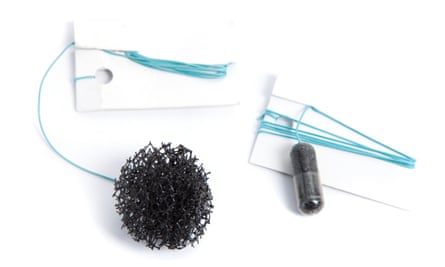The NHS is to offer a 10-minute “sponge on a string” test to 120,000 patients in England with heartburn to see if it should be used to screen millions of people for one of the world’s deadliest cancers.
Patients swallow a soluble pill attached to a thread which, when washed down with a glass of water, releases a sponge the size of a 50p coin to collect cells from the oesophagus as it is retrieved.
It is then pulled out using the attached thread, allowing the cells it has gathered to be analysed to see if someone has Barrett’s oesophagus, which raises the risk of developing oesophageal cancer.
Oesophageal cancer – cancer of the food pipe – is on the rise and is closely associated with risk factors such as poor diet, smoking, alcohol consumption and having a hiatus hernia.
Trials have already shown that the test can reliably identify people with Barrett’s oesophagus. Now doctors and scientists have launched a new trial aimed at showing that using it in a targeted screening programme can help prevent oesophageal cancer and reduce deaths from this disease.
The “sponge on a string” test has generated a lot of interest because it takes far less time than an endoscopy, is far less invasive, quicker to access, and is £300 cheaper each time for the NHS to carry out.
It is hoped that using the test to screen for the disease could save lives and reduce the need for the “labour-intensive” endoscopy – a camera down the throat – which is the “gold standard” to diagnose and treat this type of cancer.
The Best4 screening trial has been hailed as the “pinnacle of many years of painstaking research”. The first patients began the trial on Thursday and 120,000 will join them over the next three years.
People who regularly take medication for heartburn will be invited to join with a text message from the NHSh.
Prof Rebecca Fitzgerald, director of the Early Cancer Institute at the University of Cambridge, invented the sponge test and is co-principal investigator of the Best4 trial.
She said: “The capsule sponge is changing how we detect Barrett’s oesophagus and oesophageal cancer. Catching it earlier can save lives by reducing the need for chemotherapy and surgery to remove the oesophagus.”
As part of the trial, patients will visit mobile vans for the 10-minute test, where they will be given a small, coated pill attached to a thread.
after newsletter promotion

When this reaches the stomach, the coating dissolves and releases a small sponge. This collects cells from the oesophagus as it is pulled from the stomach and will then be sent to be tested for signs the patient could be at risk of developing oesophageal cancer.
“Thousands of people have already benefited in trials and pilot programmes, and now we’re taking the test to the next level to see if we could offer this to everyone with heartburn,” said Fitzgerald.
“The Best4 screening trial could fundamentally transform the lives of people affected by oesophageal cancer by providing the crucial evidence needed to make it a viable screening programme, rolled out to every part of the UK.”
The trial has been backed by £6.4m from Cancer Research UK and the National Institute for Health and Care Research.
Cancer Research UK’s chief executive, Michelle Mitchell, said the test was one of the “most exciting early-detection tools” to emerge in recent years. “After many decades of research, we’re on the cusp of transforming oesophageal cancer diagnosis for ever,” she said.

.png) 1 month ago
15
1 month ago
15













































